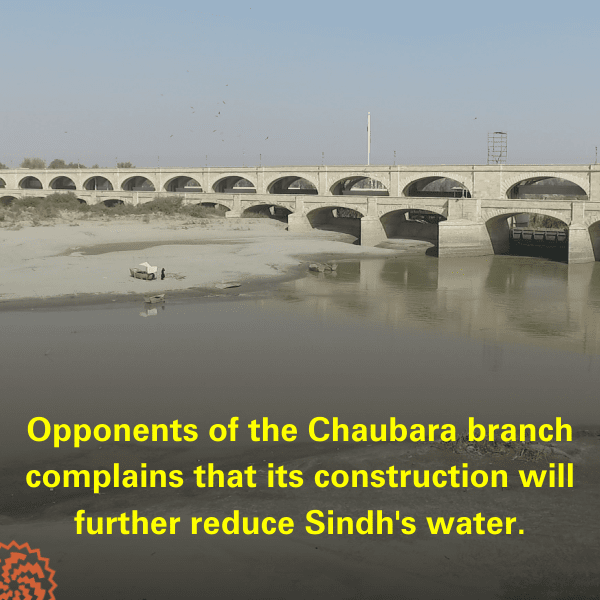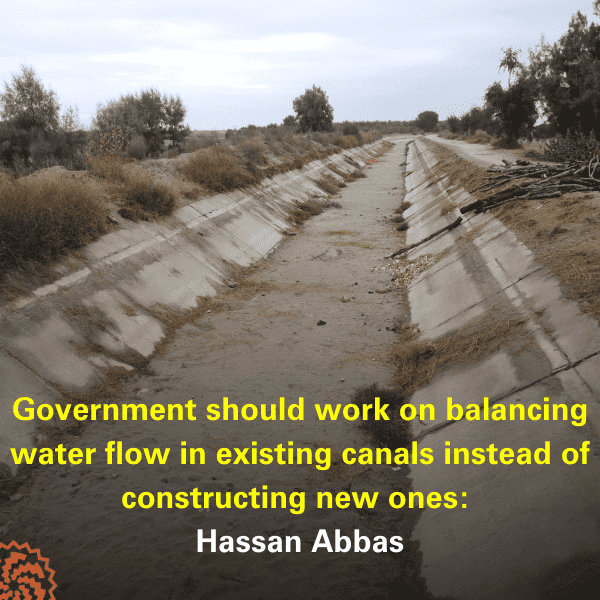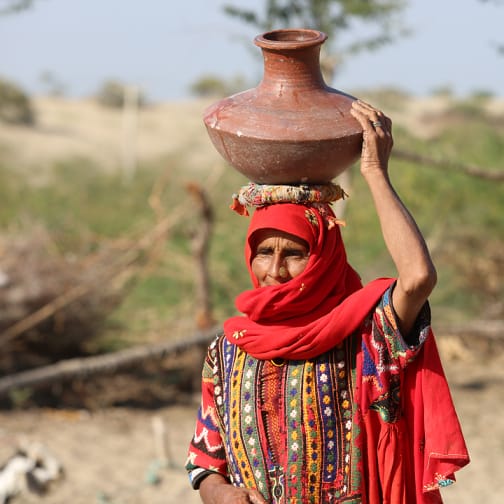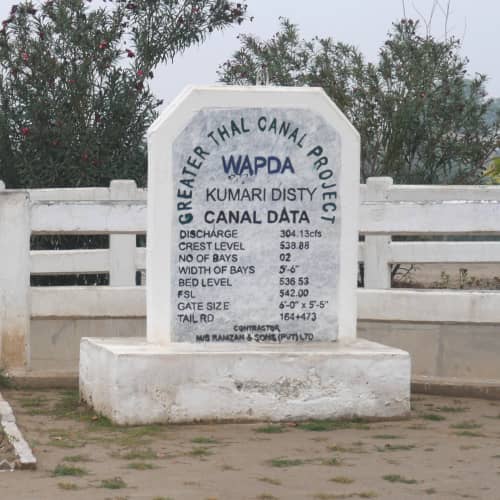Dressed in white, a middle-aged Amanullah Saifi cuts an imposing figure. Like a religious preacher, he sports a flowing black beard reaching his chest, his head covered with a big turban. His height and stout physique suggests it would not be difficult for him to assert himself in an argument or negotiation, and have his way with people.
On an early January morning in 2022, a couple of government officials carrying files wait anxiously for him outside his office. When he arrives, at last, the officials leap up and towards his white car to welcome him.
As an Assistant Commissioner of the Mankera Tehsil at Bhakkar District in western Punjab, Amanullah Saifi is also the deputy director of the project management unit working under the Punjab Irrigation Department. He is responsible for land acquisition for the Chaubara Branch Canal (CBC) being built in the Thal desert to help enhance agricultural production in districts of Punjab currently dependent on rain-fed agriculture.
The project area falls within the boundaries of Bhakkar, Layyah, Khushab, Jhang and Muzaffargarh districts. The way Saifi goes about this job of land acquisition for CBC suggests all the rigour and focus required of someone performing an important national duty. Flipping through pages of files piled on his table, he stops every now and then to seek details from the officials seated before him in his office.
The CBC is a part of the Greater Thal Canal launched in 2002, under the military ruler General Pervez Musharraf. The project aimed at irrigating over 1.7 million acres of desert plains falling in Mianwali, Jhang, Khushab, Layyah, Bhakkar and Muzafarghar districts of Punjab.
To irrigate this land, four sub canals would be taken out from the Greater Thal Canal. Mankera, one of the four branches, has already been completed. Amanullah Saifi said that for Chaubara, the next branch which is 71 kilometres long, lands through which the canal will pass have been identified. He said payment of compensation to land owners was underway.
"A landlord owning 25 acres of land in Thal lived a life more miserable than a labourer in central Punjab," he said, explaining why the project was initiated by the Punjab government. "There is no water available for cattle, leave alone irrigation."

He said once the canals were built, the residents of Thal would be able to "live comfortably like farmers in the rest of the country."
And for that reason, not only does he want "positive reporting" of the project but insists his words should be quoted verbatim, ensuring every word is produced exactly as he said it.
Negative reportage, he said, would damage this "vital project of national importance."
“This project is of crucial importance to food self-sustainability and therefore reporting anything other than the facts narrated by me is akin to damaging national interest,” he said.
Amanullah Saifi doesn't stop at that. He wants more to ensure a quick completion of the Greater Thal Canal due to its economic importance. He wants the Punjab government to impose an emergency, making it binding on government departments to complete work on the project.
He wants the courts to not consider any petitions against the project. “The courts should assign the duty of disposing of such applications to the assistant commissioners to avoid any delay in project completion,” he added.
Where will the water come from?
On November 22, 2021, the provincial assembly in Sindh province passed a resolution against the construction of the Chaubara branch. All political parties supported the motion including the party in power in the province, the Pakistan Peoples Party, and the parties in alliance with the federal government - the Mutahida Qaumi Movement and the Grand Democratic Alliance.
In his speech before the house, the Sindh Minister for Irrigation Jam Khan Shoro said the province was not given its share of water under the 1991 Accord of Apportionment of Waters of the Indus River System between the provinces of Pakistan. He said while Sindh faced acute water shortages, new canals were being constructed in Punjab, channeling away its share of water to lands elsewhere.
Jamaluddin Mangan, special secretary (technical) at the Sindh Irrigation Department cites data that bear out the concerns expressed by his minister. An analysis of figures for the past 20 years, he said, showed that his province had received 18 per cent less than its share of water.
"This figure would further decrease after construction of another canal system in Punjab," he said.

Referring to the 1991 Water Apportionment Accord, he said that the agreement also provided for a certain quantity of water to be drained into the sea below Kotri to protect habitats, agriculture and aquatic life in districts at the far edges of the Indus delta.
"Decrease in the quantity of drainage will badly affect the agriculture, animals and plants in districts located in the Indus delta," he said.
Moreover, he added, construction of a project that may result in less water for the downstream districts would be in violation of the Water Apportionment Accord of 1991.
In a meeting of the Executive Committee of National Economic Council (ECNEC) on December 22, 2022, Nisar Khurho, who represented Sindh, voiced opposition to the construction of Chaubara Canal.
A news report published in an Urdu newspaper quoted Khurho saying that due to the absence of river water in lower Sindh, about 3 million acres of land in Thatta and Badin districts in lower Sindh had been claimed by the sea.
Khurho warned the participants at the meeting, chaired by Federal Finance Minister Shaukat Tarin, that the people of Sindh would resist the federal government attempts to give their share of water to Punjab through the CBC canal system.
Also Read

Dry as dust: Rush to mine local coal worsens Tharparkar's long-standing water woes
When asked, Amanullah Saifi insists that canals of the Greater Thal Canal would not be fed from the Sindh's share of water.
He said that it had already been mentioned in the 1991 Water Accord that these canals could receive 1.873 million acre-feet of water in the kharif season [from April to September when crops are usually sown at the beginning of the first rains during the advent of monsoon season and harvested at the end.]
He said that in 2002, at the time of approval of the Greater Thal Canal project, the government also approved the construction of Kachhi Canal for Balochistan and Rainee Canal for Sindh.
He questioned if Sindh had no objection to the construction of these two canals, "why can't the Greater Thal Canal and its Chaubara branch be made?"
Umar Karim, a Mirpur Khas based water and agriculture expert, contests Amanullah Saifi's claim that the Greater Thal Canal and its branches would only use 1.7 MAF water. He said that the 1991 Water Accord provided for a water flow of 5000 cubic metre per second in the Greater Thal Canal whereas the canal had been designed to accommodate a water flow of 8500 cubic metre per second.
Figures made available by Barqab, a subsidiary of Wapda responsible for the construction of the Greater Thal Canal, also confirm that the water flow in the canal would be 8500 cubic metre per second.
Going by that estimate, said Umar Karim, the annual water flow in the canal came to 6.15 MAF. “Since this canal will operate for only six months in a year, the annual water flow will amount to 3.08 MAF which is certainly higher than what is allowed under the 1991 Water Accord."
Responding to the objections raised over Rainee and Kacchi canals, he said that Sindh had not used the water reserved for them. "The main reason for not utilising that water is that since the existing canals did not have adequate water, how could it be made available for new canals?"
Hassan Abbas, another water expert, agrees with Umar Karim. He said that the Greater Thal Canal and its branches were being constructed in an area where water was available to some extent.
He said if more land was not brought under cultivation in this area, the need for more water for the purpose would also not arise.
Besides, he said, many parts of the country with canals had no water left for agriculture. "The government should focus on ensuring balanced flows in existing canals to save lands from turning barren instead of digging up more canals to bring more land under cultivation."
Published on 21 Aug 2022



















